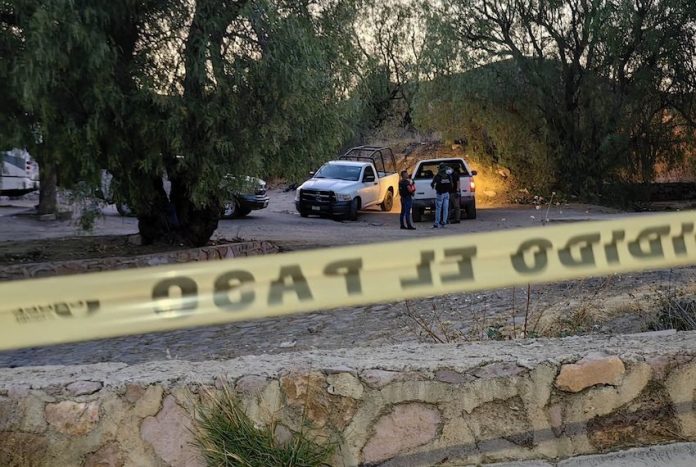Criminal gangs have multiplied during the current presidential administration in Mexico, corrupting local democracies, tightening their grip on the economy and creating a security crisis.
Claudia Sheinbaum, the leading candidate ahead of the June 2 elections, would undoubtedly face ever more brazen — and politically motivated — criminal actors if she becomes Mexico’s next president.
Since the election of President Andrés Manuel López Obrador in 2018, organized crime has ramped up efforts to strong-arm the state. Favored tactics include road blockades, banners threatening officials and the dumping of human remains outside government buildings.
Political assassinations are the most direct line of attack. The current campaign season is shaping up to be the deadliest on record, according to data from the Mexican think tank Laboratorio Electoral. Since the official start of the electoral season on September 7th, 2023 until the publication of this piece, 30 political aspirants and candidates have been slain in Mexico. Hundreds have withdrawn from the race (358 candidates in Zacatecas and another 190 candidates in Michoacán) — while an unknown quantity chose not to risk running at all.
Organized crime groups were likely behind most of these killings. As politicians across the country hit the campaign trail, gangs launched their own violent bids for increased protection and influence.
Criminals are also desperate to collaborate with politicians. Gangs have little chance of survival unless they can secure under-the-table deals with mayors and turf pacts with police. Illegal campaign financing is an ongoing concern. In troubled regions, criminal groups even field their own candidates.
Alongside the growing threat of “narco politics,” the new Mexican president will also have to shield the economy from the worst impacts of criminality. In recent years, gangs have diversified beyond drug trafficking. Illicit activities such as cargo theft and counterfeiting are a mounting problem for the private sector.
Extortion is an even greater menace to businesses. Criminal groups historically demanded payments from small-scale vendors, such as market workers or chicken shop owners. Today, they routinely fix prices by forcing family-owned businesses to buy products at inflated costs from suppliers they have compromised; for instance, fruit or poultry farms. Business leaders say gangs in at least 10 Mexican states are even banning the sale of products from companies outside their extortion rackets.
Nor is this crisis contained. Security challenges in Mexico have consequences that cross borders. Gangs threaten regional supply chains and forcibly displace communities, fueling undocumented migration. Criminal fragmentation also risks creating new entrants into the fentanyl market. That shift could deepen the opioid overdose crisis in the United States, as inexperienced cooks inaccurately measure substances.
Sheinbaum, the candidate for the ruling National Regeneration Movement (Morena) party, is keen to downplay this situation. The heavy favorite for the presidency, Sheinbaum has already backed the non-confrontational approach of President López Obrador. She also plans to double down on the militarization of public security. As well as spending heavily on the army, Sheinbaum hopes to complete the transfer of the National Guard, Mexico’s main federal law enforcement agency, from civilian to military control, which has been halted by the Supreme Court. But neither the army nor the National Guard have proven effective in tackling criminal networks. Both forces have also been accused of widespread human rights abuses.
Despite these failings, the leading candidate has outlined some policies that could prove effective. Sheinbaum hopes to strengthen Mexico’s intelligence agency and create a national crime database. She also wants to classify extortion as a serious crime.
But the next administration will face security challenges of an unprecedented scale. Turning a blind eye to the crisis is unlikely to remain an option. The widespread use of shock and awe tactics by Mexican mafias, criminal infiltration into politics and the economic impact of extortion will demand a response from the new president. That emergency will heighten calls to strengthen investigative capacities and counter the outrageous impunity that persists across Mexico.
Greater cooperation with U.S. security agencies is also essential. Both countries need to scrutinize suspicious financial activity and crack down on weapons trafficking. To be truly effective, Mexico’s next president must work from an understanding that insecurity in Mexico is part of a shared crisis with the United States.
Stephen Woodman is the associate director of Advanced Intelligence Solutions (AIS), a consultancy that works with government agencies and corporations to identify and mitigate security risks across Latin America. Based in Guadalajara, Mexico, he primarily investigates organized crime. Woodman was formerly a journalist, covering security and human rights in Mexico. His investigative features have been published by the Financial Times, BBC News and Reuters, among other outlets.
This article was originally published by the Wilson Center’s Mexico Institute.
Disclaimer: The views expressed in this article are solely those of the author and do not necessarily reflect the views of Mexico News Daily, its owner or its employees.
